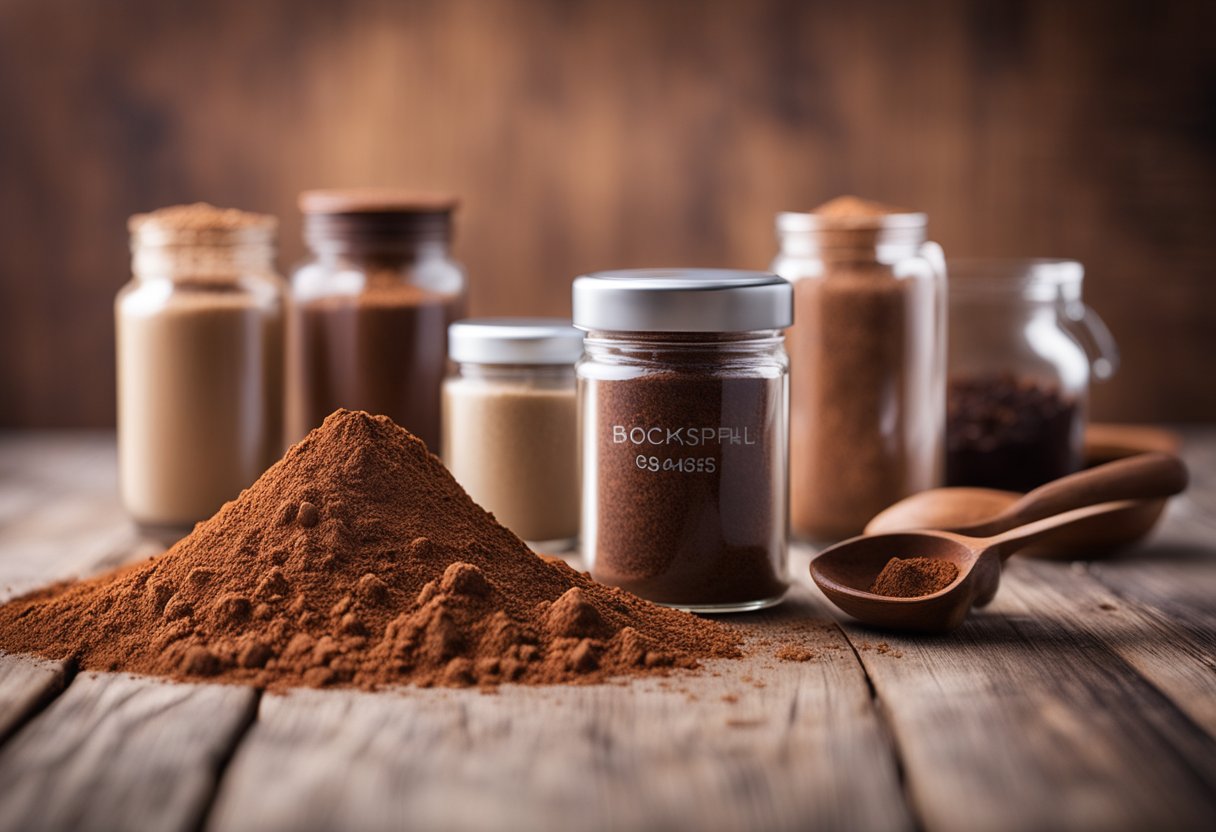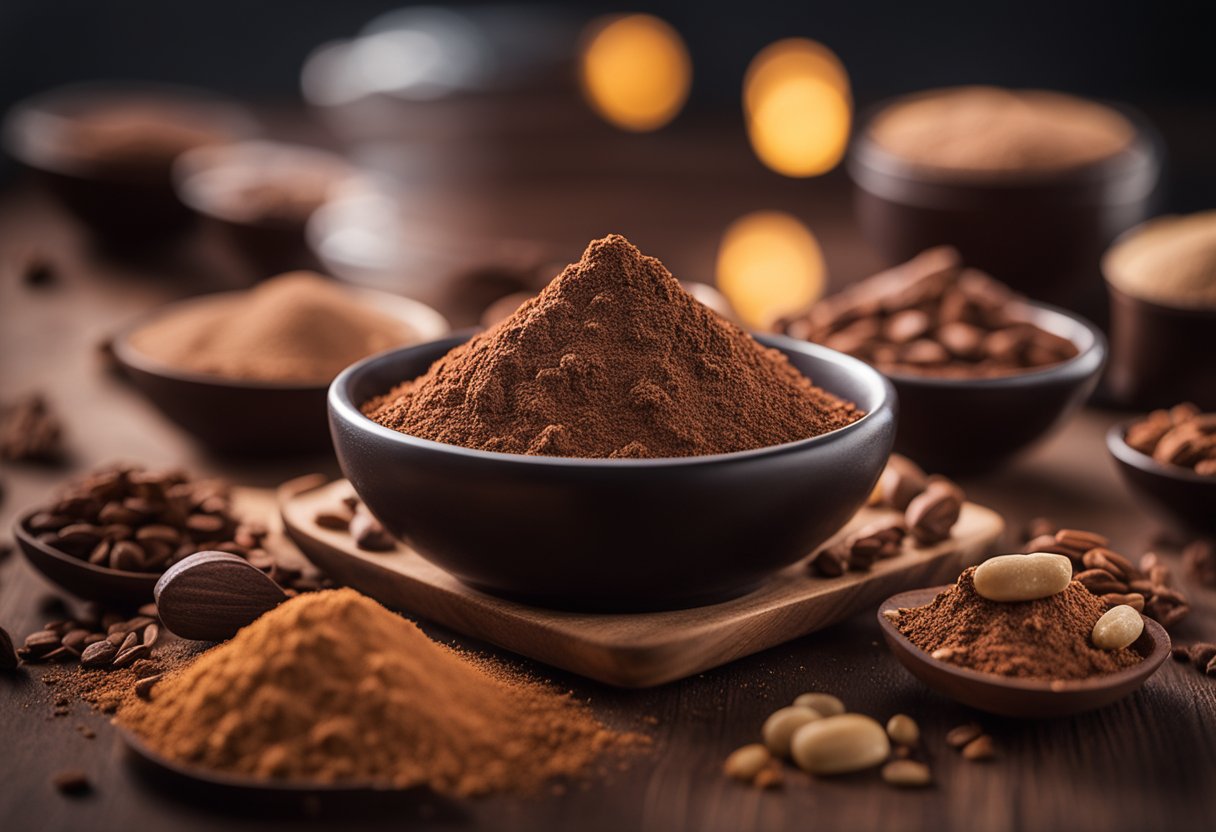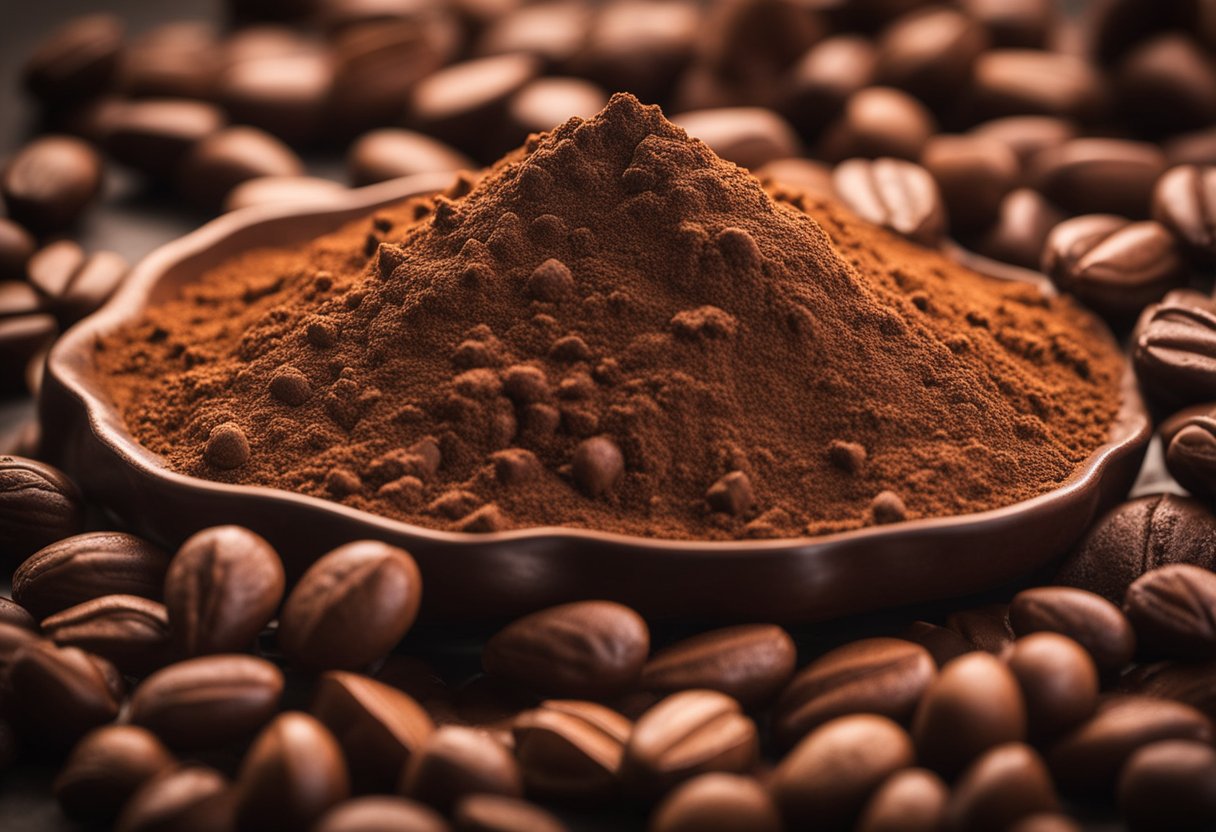As a baker, running out of cocoa powder can be frustrating, especially when you’re in the middle of making your favorite chocolate dessert. However, there are several cocoa powder substitutes that can save the day.
These substitutes can provide a similar flavor and texture to your recipes, and some even offer unique flavor profiles that can take your baked goods to the next level.

Understanding cocoa powder and its role in recipes is essential when looking for substitutes. Cocoa powder is made by removing the cocoa butter from chocolate liquor and grinding the remaining solids into a fine powder.
It’s used in a variety of recipes, from cakes and brownies to hot chocolate and smoothies. Cocoa powder provides a rich chocolate flavor and dark color to baked goods, making it a staple ingredient in many recipes.
Why substitute cocoa powder? Sometimes, you may want to avoid using cocoa powder due to dietary restrictions or personal preferences. For example, cocoa powder contains caffeine, which may not be suitable for everyone.
Additionally, some people may not like the bitter taste of cocoa powder. Whatever your reason may be, there are several cocoa powder substitutes available that can provide similar results in your recipes.
Key Takeaways
- Cocoa powder substitutes can save the day when you run out of cocoa powder.
- Understanding cocoa powder and its role in recipes is essential when looking for substitutes.
- There are several chocolate-based and non-chocolate substitutes available that can provide similar results in your recipes.
Understanding Cocoa Powder
Cocoa powder is a key ingredient in many dessert recipes, providing a rich chocolate flavor and dark color. It is made from cacao beans, which are fermented, roasted, and dried.
The resulting cocoa solids are then ground into a fine powder, which is used in baking and cooking.
There are two main types of cocoa powder: natural cocoa and Dutch-processed cocoa. Natural cocoa powder is made from cocoa solids that have not been alkalized, while Dutch-processed cocoa powder has been treated with an alkalizing agent to reduce its acidity and bitterness.
Dutch-processed cocoa powder is often darker in color and has a milder, less acidic flavor than natural cocoa powder. However, it may not work as well in recipes that rely on the acidity of natural cocoa powder to activate leavening agents like baking soda.
When shopping for cocoa powder, look for unsweetened cocoa powder, which contains no added sugar. Cocoa mix and hot cocoa mix are not suitable substitutes for cocoa powder, as they typically contain sugar, powdered milk, and other additives.
Drinking chocolate or drinking chocolate powder is a separate product from cocoa powder and is intended to be mixed with milk or water to make a hot chocolate drink. It is often sweetened and may contain cocoa butter for a richer flavor and creamier texture.
Cocoa butter is the fat extracted from cocoa beans during the production of cocoa powder. It is used in chocolate making and can also be used in baking and cooking as a substitute for butter or oil.
In summary, cocoa powder is a processed product made from fermented, roasted, and dried cacao beans. It comes in two main types: natural cocoa and Dutch-processed cocoa, with different flavors and acidity levels.
When using cocoa powder in recipes, make sure to use unsweetened cocoa powder and avoid using cocoa mix or hot cocoa mix as substitutes.
Why Substitute Cocoa Powder
As a baker, I know how frustrating it can be to run out of an essential ingredient in the middle of a recipe.
Cocoa powder is a staple ingredient in many baked goods, but it’s not always easy to find or keep on hand. Luckily, there are several substitutes for cocoa powder that can be used in a pinch.
One reason to substitute cocoa powder is if you have a chocolate allergy or sensitivity. While cocoa powder is made from roasted cacao beans, it is still possible to be allergic to it.
In this case, using a cocoa powder substitute such as carob powder or cacao nibs can provide a similar flavor without the risk of an allergic reaction.
Another reason to substitute cocoa powder is if you’re trying to reduce the amount of sugar in your diet. Many cocoa powders contain added sugar, which can be problematic for those with diabetes or who are trying to limit their sugar intake.
Using a cocoa powder substitute such as unsweetened baking chocolate or dark chocolate can provide a chocolate flavor without the added sugar.
Additionally, some people may prefer to use a cocoa powder substitute because of the taste. While cocoa powder has a rich, chocolatey flavor, some people find it too bitter or acidic.
In this case, using a cocoa powder substitute such as Dutch-process cocoa powder or melted chocolate can provide a milder, sweeter flavor.
Overall, there are many reasons why someone might choose to substitute cocoa powder in their baking.
Whether it’s due to an allergy, dietary restrictions, or personal preference, there are plenty of cocoa powder substitutes available that can provide a similar flavor and texture to traditional cocoa powder.
Chocolate-Based Substitutes
When it comes to cocoa powder substitutes, chocolate-based options are a great choice. Chocolate chips, baking chocolate, dark chocolate, and sweetened chocolate can all be used as replacements for cocoa powder in recipes.
For a 1:1 substitute, use unsweetened baking chocolate or unsweetened cooking chocolate. If you’re using sweetened chocolate, reduce the sugar in the recipe accordingly.
For example, if the recipe calls for 1/4 cup of cocoa powder and 1 cup of sugar, you could use 4 ounces of unsweetened baking chocolate and 3/4 cup of sugar instead.
Chocolate chips are another great option for cocoa powder substitutes. They can be used in cookies, brownies, and other baked goods. For a 1:1 substitute, use 1 cup of chocolate chips for every 1/4 cup of cocoa powder.
Dark chocolate and bittersweet chocolate can also be used as a cocoa powder substitute in recipes. They have a similar flavor profile and can be melted down and used in place of cocoa powder.
For a 1:1 substitute, use 1 ounce of dark chocolate or bittersweet chocolate for every 1 tablespoon of cocoa powder.
Melting chocolate or couverture chocolate can also be used as a cocoa powder substitute. They have a similar flavor profile and can be melted down and used in place of cocoa powder.
For a 1:1 substitute, use 1 ounce of melting chocolate or couverture chocolate for every 1 tablespoon of cocoa powder.
Chocolate syrup and chocolate liquor can also be used as a cocoa powder substitute in recipes. They have a similar flavor profile and can be used in place of cocoa powder.
For a 1:1 substitute, use 1/4 cup of chocolate syrup or chocolate liquor for every 1/4 cup of cocoa powder.
Overall, chocolate-based substitutes are a great choice when you’re out of cocoa powder. They provide a similar flavor and can be used in a variety of recipes, from chocolate desserts to hot chocolate drinks.
Non-Chocolate Substitutes

As much as we love chocolate, sometimes we need to switch it up. Fortunately, there are plenty of non-chocolate substitutes for cocoa powder that can still give your recipes a rich and flavorful taste.
One of the most popular non-chocolate substitutes is carob powder. Made from the pods of the carob tree, carob powder has a naturally sweet flavor and can be used in a 1:1 ratio in place of cocoa powder.
It also has a lower fat content and is caffeine-free, making it a great option for those watching their diet or caffeine intake.
Cacao powder, made from cold-pressed cacao beans, is another great substitute for cocoa powder. It has a similar taste and texture to cocoa powder and can be used in equal amounts in recipes.
Cacao nibs, which are pieces of roasted cacao beans, can also be used in place of cocoa powder for a crunchy texture.
If you’re looking for a darker, more intense flavor, black cocoa powder is a great option. It has a higher pH level than regular cocoa powder, which gives it a more intense flavor.
However, it is important to note that it is not interchangeable with regular cocoa powder in recipes and should only be used in small amounts.
When it comes to leavening agents, there are a few non-chocolate substitutes that can be used in place of cocoa powder. White vinegar, lemon juice, and cream of tartar can all be used to activate baking soda and create a leavening effect.
Baking powder, which is a combination of baking soda and cream of tartar, can also be used in place of cocoa powder in recipes.
For sweeteners, sugar is the most common substitute for cocoa powder. Other options include honey, maple syrup, and agave nectar.
Milk powder or powdered milk can also be used to add a creamy texture to recipes, while hazelnut or chocolate spread can add a nutty or chocolatey flavor.
When it comes to fats, butter, oil, shortening, and coconut oil can all be used in place of cocoa powder. Vanilla and salt can also be added to enhance the flavor of your recipe.
Overall, there are plenty of non-chocolate substitutes for cocoa powder that can still give your recipes a delicious taste. Experiment with different options to find the one that works best for you and your recipe.
Using Substitutes in Recipes
When it comes to substituting cocoa powder in recipes, there are a few things to keep in mind. First, it’s important to understand the role that cocoa powder plays in the recipe.
Cocoa powder is often used to add a chocolate flavor and color to baked goods, but it also affects the texture and structure of the final product.
If you’re using a substitute for cocoa powder, it’s important to choose one that will provide similar flavor and texture.
For example, if you’re using melted chocolate as a substitute, you may need to adjust the amount of sugar in the recipe to compensate for the added sweetness.
One way to use cocoa powder substitutes is to experiment with different ratios until you find the one that works best for your recipe.
For example, if you’re using cacao nibs as a substitute, you may need to use more than you would if you were using cocoa powder, since cacao nibs are less concentrated.
Another option is to use a blender to make your own cocoa powder substitute. Simply blend together ingredients like unsweetened chocolate, sugar, and cornstarch until you have a fine powder.
This can be a great option if you don’t have any cocoa powder on hand, or if you’re looking for a more natural substitute.
Overall, using substitutes in recipes can be a great way to experiment with different flavors and textures. Just be sure to choose a substitute that will work well with your recipe, and be prepared to make adjustments as needed.
Health Benefits of Substitutes
As a nutritionist, I always encourage people to use healthier substitutes for ingredients whenever possible.
Cocoa powder substitutes not only provide a unique flavor to dishes but also have several health benefits. Here are some of the health benefits of cocoa powder substitutes:
Antioxidants
Cocoa powder substitutes such as carob powder, dark chocolate, and cacao nibs contain antioxidants that can help protect against cell damage caused by free radicals.
Antioxidants are known to reduce inflammation, improve cholesterol and blood sugar levels, and boost cognitive function.
Blood Pressure
Cocoa powder substitutes can help lower blood pressure due to the presence of flavanols. Flavanols are plant-based compounds that can help improve blood flow and reduce blood pressure. Substitutes such as dark chocolate and cacao nibs are especially high in flavanols.
Weight Loss
Cocoa powder substitutes such as carob powder and unsweetened baking chocolate are lower in calories and fat than cocoa powder.
They can also help promote feelings of fullness and reduce appetite, making them useful as part of a weight-loss plan.
Immunity
Cocoa powder substitutes can help boost the immune system due to the presence of polyphenols. Polyphenols are plant-based compounds that have been linked to a reduced risk of chronic diseases such as cancer and diabetes.
Substitutes such as dark chocolate and cacao nibs are especially high in polyphenols.
In conclusion, cocoa powder substitutes offer a range of health benefits that make them a great addition to any diet. From antioxidants to immunity-boosting properties, these substitutes can help improve overall health and well-being.
Unique Substitutes
When it comes to cocoa powder substitutes, there are plenty of unique options to choose from. Here are a few that I recommend:
Carob Powder
Carob powder is a great alternative to cocoa powder, especially if you’re looking for a caffeine-free option. It has a naturally sweet flavor and can be used in a variety of recipes, including baked goods and hot chocolate.
Keep in mind that carob powder is not as rich as cocoa powder, so you may need to use a bit more to achieve the same level of chocolatey flavor.
Peanut Butter Powder
Believe it or not, peanut butter powder can be used as a cocoa powder substitute in some recipes. It has a nutty flavor that pairs well with chocolate, and it also adds a bit of protein to your recipe.
To use peanut butter powder as a substitute, simply mix it with a bit of water to create a paste, then add it to your recipe.
Oreo Cookies
If you’re making a recipe that calls for cocoa powder and you’re out of it, you can get creative and use crushed up Oreo cookies instead.
Oreo cookies have a chocolatey flavor and are made with cocoa powder, so they make a great substitute. Just be aware that they also contain sugar and other ingredients that may affect the taste and texture of your recipe.
Nutella
Nutella is a chocolate hazelnut spread that can be used as a cocoa powder substitute in some recipes. It has a rich, chocolatey flavor and a creamy texture that works well in baked goods and desserts.
Keep in mind that Nutella also contains sugar and other ingredients, so you may need to adjust the amount of sugar in your recipe if you use it as a substitute.
Chocolate Chips
If you have chocolate chips on hand, you can use them as a substitute for cocoa powder in some recipes. Simply melt the chocolate chips and use them in place of cocoa powder.
Keep in mind that chocolate chips contain sugar and other ingredients, so you may need to adjust the amount of sugar in your recipe if you use them as a substitute.
Overall, there are plenty of unique cocoa powder substitutes to choose from. Whether you’re looking for a caffeine-free option or just want to get creative in the kitchen, these substitutes are sure to add a delicious chocolatey flavor to your recipes.
Frequently Asked Questions

What are some substitutes for cocoa powder in cookies?
If you run out of cocoa powder, you can use melted chocolate, chocolate chips, or carob powder as a substitute in cookies. However, keep in mind that these substitutes may alter the texture and flavor of your cookies.
What are some alternatives to cocoa powder in frosting?
If you don’t have cocoa powder, you can use melted chocolate or chocolate syrup as a substitute in frosting. You can also use carob powder or powdered peanut butter if you want to avoid chocolate.
How do I substitute cocoa powder for baking chocolate?
If your recipe calls for baking chocolate but you only have cocoa powder, you can use 3 tablespoons of cocoa powder and 1 tablespoon of butter or oil to replace 1 ounce of baking chocolate.
What are some substitutes for cocoa powder in hot chocolate?
If you don’t have cocoa powder, you can use melted chocolate or chocolate chips as a substitute in hot chocolate. You can also use hot cocoa mix or carob powder if you want to avoid chocolate.
How can I substitute chocolate chips for cocoa powder?
If your recipe calls for cocoa powder but you only have chocolate chips, you can use 1 ounce of chocolate chips to replace 3 tablespoons of cocoa powder. Melt the chocolate chips before using them in your recipe.
Can I use hot chocolate instead of cocoa powder in brownies?
No, you cannot use hot chocolate instead of cocoa powder in brownies. Hot chocolate mix contains sugar and other ingredients that will alter the texture and flavor of your brownies. Use cocoa powder or baking chocolate instead.







